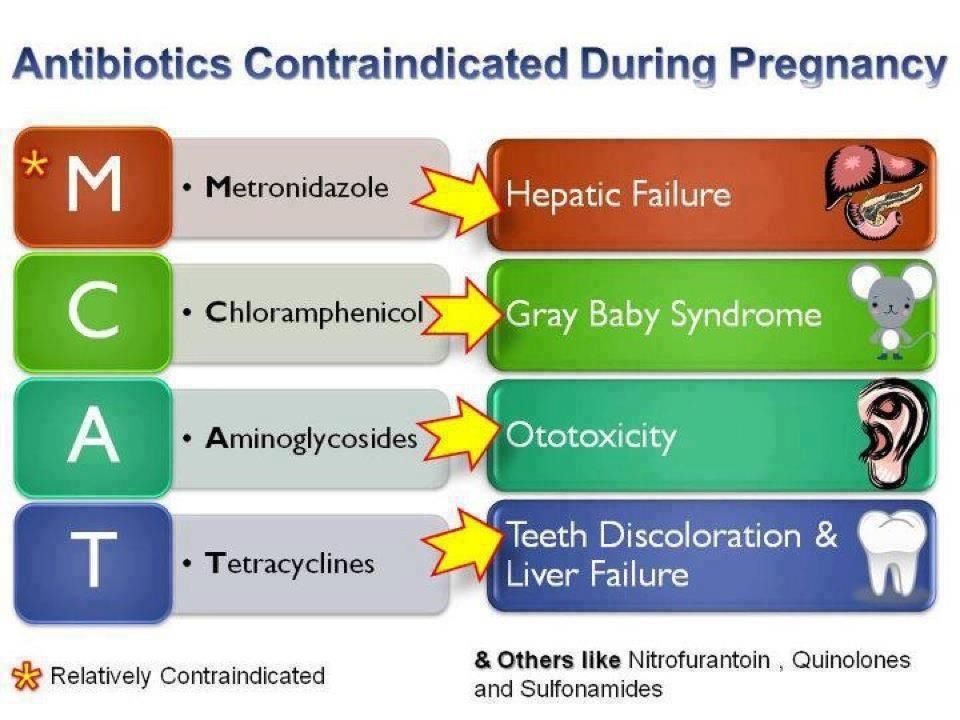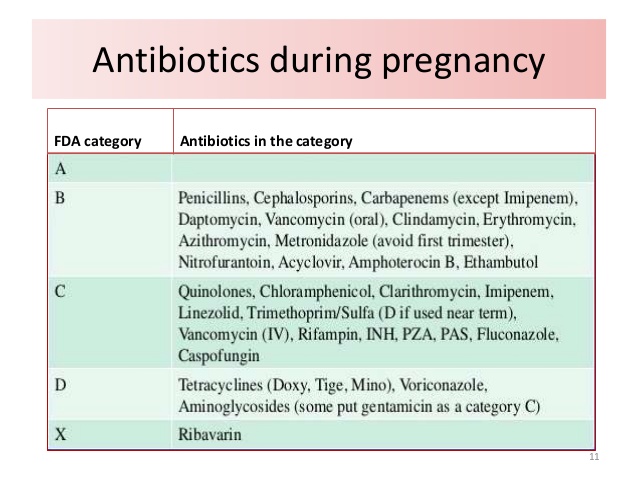Antibiotics During Pregnancy

Contents:
- Antibiotics During Pregnancy
- The List of Cases When it is Impossible to do Without Antibiotics
- Possible Risks
- Prohibited Antibiotics
- What Antibiotics are Safe During Pregnancy?
- Antibiotics During Conception
Antibiotics and Pregnancy
Antibiotics are special medications that destroy all sorts of bacteria in the human body. They include, for example, tetracycline and penicillin. Such popular drugs like aspirin and analgin do not belong to the group of antibiotics. There are also medications designed to deal with different microbes in the external environment, which also are not antibiotics. For example, brilliant green antiseptic, iodine and chlorhexidine. Antibiotics can only fight certain bacteria; they cannot resist fungi or viruses. Quite often, bacteria may be resistant to a particular antibiotic. In such a case, the doctors should prescribe another drug.
Of course, sometimes it is impossible to do without antibiotics, but do not forget about their side effects. Often drugs are toxic and affect the liver functioning. Some antibiotics belonging to the group of gentamicin also can affect internal organs, especially the inner ear and kidneys. It should be added that almost all antibiotics kill all bacteria in the body, regardless of whether they are useful or harmful. Therefore, after taking antibiotics, the patient often has such side effects as dysbacteriosis, diarrhea, skin rash and so on.
However, the worst side effect is that harmless bacteria may become harmful and dangerous after the intake of antibiotics. These new bacteria can be found in hospitals, they are transmitted from a doctor to patients, as they live on the human skin and mucous membranes. One of the most dangerous of such bacteria is methicillin-resistant staphylococcus aureus (MRSA). It is resistant to the strongest antibiotics.
Antibiotics During Pregnancy
The pregnant woman can take only antibiotics prescribed by the doctor if there is a serious reason for it. It is permissible in cases when the potential damage from antibiotics is smaller than the benefit for both the women and the fetus. The pregnant woman can’t self-administer antibiotics, it can be done only under the supervision of doctors in the department of pregnancy’s pathologies.
As in the first trimester of pregnancy almost all medications may affect the development of the child, antibiotics are not administered. At the late stage of pregnancy, the antibiotics will do you less harm, but only your doctor can decide on the exact terms. Every medication has terms when its intake has minimal risks for the health of both the mother and the baby. Your doctor can give you more information about it.
Before prescribing an antibiotic your doctor will ask you to pass few tests to determine what bacteria have caused the disease. After the examination of the tests’ results, the doctor will be able to determine which antibiotic will be most effective for you.
The tests will also show the woman’s drug sensitivity. If, for some reason, it is impossible to conduct this test, the doctor will prescribe a broad-spectrum antibiotic, which can destroy a great number of bacteria.
The List of Cases When it is Impossible to Do Without Antibiotics

The most common diseases that require antibiotic intake, are:
- pneumonia and bronchitis;
- pyelonephritis;
- tonsillitis;
- injuries and septic wounds;
- serious infection in the intestines;
- burns;
- blood poisoning, sepsis;
- fever, lyme borreliosis etc.
In all these cases above, the antibiotics intake has a greater benefit than the possible harm. Risk for the baby is smaller than the potential benefits for the pregnant woman.
Possible Risks
Antibiotics intake during pregnancy mostly affects the fetus, not the pregnant women. Some antibiotics can penetrate via the placenta into the bloodstream of the baby and damage an organ that is growing and developing the most actively at this time.
Antibiotics during pregnancy are divided into three groups, namely:
- completely forbidden due to their toxic effects on the fetus;
- allowed, as they don’t harm the fetus;
- drugs which effects are insufficiently studied. Such drugs are administered only in cases of extreme necessity.
Prohibited Antibiotics
Tetracycline, doxycycline are prohibited, as they penetrate via the placenta to the baby, and accumulate in the fetal bones and teeth obstructing their mineralization. They have a toxic effect on the liver.
The family of fluoroquinolones (ciprolet, nolicin, abaktal, ciprofloxacin, floxal) is also prohibited. Studies conducted on animals have shown that these drugs can damage the joints of the fetus.
The clarithromycin family (klacid, fromilid, klabax) is prohibited, as studies on animals have proved its toxicity.
Midecamycin, roxithromycin (rulid, makropen) are also prohibited for the reasons mentioned above.
Aminoglycosides (streptomycin, tobramycin, kanamycin)-enter via the placenta the fetus and affect the kidneys and the internal ear of the baby. Such drugs can cause surdity in the baby.
Gentamicin also belongs to this group, but its administration is permitted in extreme cases in certain doses.
Furazidin (furamag, furagin), nifuroxazide (ercefuryl, enterofuryl) are prohibited for the pregnant women because of possible harmful effects on the fetal development.
Chloramphenicol (sintomicin, levomicetin, olasolum) is prohibited. The large amounts of this drug enter the placenta in a very short period. Its administration is the most harmful in the third trimester of pregnancy as it affects the bone marrow development and blood cells division.
Dioxidin is an antiseptic. Is prohibited for pregnant women, because its toxic and mutagenic effects have been proved on animals.
Co-trimoxazole (biceptol, groseptol, bactrim) is well known as "biceptol". The drug consists of 2 substances: sulfamethoxazole and trimethoprim. Trimethoprim penetrates through the placenta and may increase the risk of heart defects, congenital malformations, slow the fetal growth. It is very rare prescribed to the pregnant women.
Azithromycin (sumamed, zitrolid, hemomicin) treats chlamydial infections.
Nitrofurantoin (furadonin) can be used only in the middle of pregnancy, it is prohibited in the 1st and the 3d trimesters.
Metronidazole (klion, metrogyl, trichopol, flagyl)-it is prohibited to use in the early pregnancy, as it can cause defects of the brain, limbs and genitals in the baby. Later it can be used in case of extreme necessity.
Gentamicin is administered only in extreme cases, such as sepsis, or blood poisoning. It is prescribed in strictly calculated doses. Exceeding the administered dose can lead to the fetal surdity.
What Antibiotics are Safe During Pregnancy?

All the drugs mentioned below are considered safe for pregnant women. Nevertheless, do not forget that only the doctor can prescribe you an antibiotic. Penicillin antibiotics can penetrate through the placenta to the fetus, but don’t have any harmful effects on him. The pregnant woman’s kidneys excrete this antibiotic in very short terms.
The cephalosporin family including cefazolin, cephalexin, ceftriaxone, cefuroxime, cefixime, cefoperazon, cefotaxime, ceftazidime, cefepime can be prescribed to pregnant women without restrictions. It does not have adverse effects, because very low concentrations penetrate through the placenta to the baby. Erythromycin, as well as wilprafen and spiramycin can be prescribed for pregnant women. They have no harmful effects and do not obstruct the fetal development.
Antibiotics During Conception
Very often it happens that the woman do not know exactly when the conception has occurred, and learns it only within a few weeks. It can happen that at this time she is undergoing a treatment or taking antibiotics. What to do in this situation? Will medications have adverse effect on the fetus? If a woman has administered safe antibiotics, she has nothing to worry about. However, if she has taken prohibited drugs, it can lead to such terrible consequences, as a miscarriage or a spontaneous abortion.
The only thing you can do in this situation is to stop taking the medication as soon as you know about pregnancy. If the antibiotic has a negative impact, it is better to prepare for a miscarriage. If this does not happen, the fetus is likely to be all right and continue to grow and develop without any complications.
If you fear that the development of the fetus can stop, you’d better take several blood tests for HCG levels. The same results of several tests are a symptom of a miscarriage. At the term of four weeks and more, you can make an ultrasound scan to check the fetal development.
It is not worth to opt for abortion just because of antibiotics intake. If the drugs have significantly harmed the embryo, he will die himself. However, if he survives, he will continue to develop normally. If you plan to conceive, you’d better avoid antibiotics.
I was taking antibiotics during the course of pregnancy and it lead to a very disappointing.I had a case of miscarriage on the 10th week. That’s why my advice to you is not taking any risks and refuse taking any antibiotics.
What kind of antibiotic did you take?I’m 10 weeks pregnant and diagnosed with UTI my OB insists of me taking antibiotic. Im so skeptical. But she said it might lead to kidney infection. I still don’t know what to do.
Safety of azithromycin in 7th month of pregnancy??
Am taking cefixime bt 21 week is it OK to take
Im in 16 weeks now.my ob prescribe to take a cefixime because i have an infection..it is safe for my baby?
I was diagnosed of typhoid am 12weeks pregnant and the doctor prescribe ampicilline and gentimycin injection tone given through my veins, I reacted to the medication today but am confused and do not know what should i take and am really I’ll.
I’m in 11weeks now, My OB prescribe to take cefixime because of infection. It is safe for my baby? Im also worried.. ???? I keep on taking antibiotic for almost 1month I think..
My Wife is 18 week can she take E mox ( Amoxicillin ) for boils treament